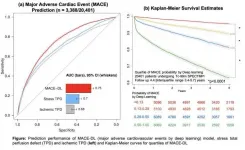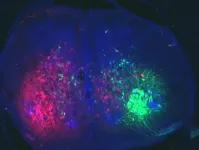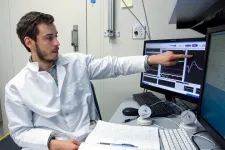(Press-News.org) Reston, VA (Embargoed until 6:15 p.m. EDT, Friday, June 11, 2021)--An advanced artificial intelligence technique known as deep learning can predict major adverse cardiac events more accurately than current standard imaging protocols, according to research presented at the Society of Nuclear Medicine and Molecular Imaging 2021 Annual Meeting. Utilizing data from a registry of more than 20,000 patients, researchers developed a novel deep learning network that has the potential to provide patients with an individualized prediction of their annualized risk for adverse events such as heart attack or death.
Deep learning is a subset of artificial intelligence that mimics the workings of the human brain to process data. Deep learning algorithms use multiple layers of "neurons," or non-linear processing units, to learn representations and identify latent features relevant to a specific task, making sense of multiple types of data. It can be used for tasks such as predicting cardiovascular disease and segmenting lungs, among others.
The study utilized information from the largest available multicenter SPECT dataset, the "REgistry of Fast myocardial perfusion Imaging with NExt generation SPECT" (REFINE SPECT), with 20,401 patients. All patients in the registry underwent SPECT MPI, and a deep learning network was used to score them on how likely they were to experience a major adverse cardiac event during the follow-up period. Subjects were followed for an average of 4.7 years.
The deep learning network highlighted regions of the heart that were associated with risk of major adverse cardiac events and provided a risk score in less than one second during testing. Patients with the highest deep learning scores had an annual major adverse cardiac event rate of 9.7 percent, a 10.2-fold increased risk compared to patients with the lowest scores.
"These findings show that artificial intelligence could be incorporated in standard clinical workstations to assist physicians in accurate and fast risk assessment of patients undergoing SPECT MPI scans," said Ananya Singh, MS, a research software engineer in the Slomka Lab at Cedars-Sinai Medical Center in Los Angeles, California. "This work signifies the potential advantage of incorporating artificial intelligence techniques in standard imaging protocols to assist readers with risk stratification."
Abstract 50. "Improved risk assessment of myocardial SPECT using deep learning: report from REFINE SPECT registry," Ananya Singh, Yuka Otaki, Paul Kavanagh, Serge Van Kriekinge, Wei Chih-Chun, Tejas Parekh, Joanna Liang, Damini Dey, Daniel Berman and Piotr Slomka, Department of Imaging, Cedars-Sinai Medical Center, Los Angeles, California; Robert Miller, Department of Cardiac Sciences, University of Calgary, Calgary, Alberta, Canada, and Department of Imaging, Cedars-Sinai Medical Center, Los Angeles, California; Tali Sharir, Department of Nuclear Cardiology, Assuta Medical Centers, Tel Aviv, and Ben Gurion University of the Negev, Beer Sheba, Israel; Andrew Einstein, Division of Cardiology, Department of Medicine and Department of Radiology, Columbia University, Irving Medical Center and New York-Presbyterian Hospital, New York, New York; Mathews Fish, Oregon Heart and Vascular Institute, Sacred Heart Medical Center, Springfield, Oregon; Terrence Ruddy, Division of Cardiology, University of Ottawa Heart Institute, Ottawa, Ontario, Canada; Philipp Kaufmann, Department of Nuclear Medicine, Cardiac Imaging, University Hospital Zurich, Zurich, Switzerland; Albert Sinusas and Edward Miller, Section of Cardiovascular Medicine, Department of Internal Medicine, Yale University School of Medicine New Haven, Connecticut; Timothy Bateman, Department of Imaging, Cardiovascular Imaging Technologies LLC, Kansas City, Missouri; Sharmila Dorbala and Marcelo Di Carli, Department of Radiology, Division of Nuclear Medicine and Molecular Imaging, Brigham and Women's Hospital, Boston, Massachusetts.
INFORMATION:
All 2021 SNMMI Annual Meeting abstracts can be found online at https://jnm.snmjournals.org/content/62/supplement_1.
About the Society of Nuclear Medicine and Molecular Imaging
The Society of Nuclear Medicine and Molecular Imaging (SNMMI) is an international scientific and medical organization dedicated to advancing nuclear medicine and molecular imaging, vital elements of precision medicine that allow diagnosis and treatment to be tailored to individual patients in order to achieve the best possible outcomes.
SNMMI's members set the standard for molecular imaging and nuclear medicine practice by creating guidelines, sharing information through journals and meetings and leading advocacy on key issues that affect molecular imaging and therapy research and practice. For more information, visit http://www.snmmi.org.
For decades, the ice shelf helping to hold back one of the fastest-moving glaciers in Antarctica has gradually thinned. Analysis of satellite images reveals a more dramatic process in recent years: From 2017 to 2020, large icebergs at the ice shelf's edge broke off, and the glacier sped up.
Since floating ice shelves help to hold back the larger grounded mass of the glacier, the recent speedup due to the weakening edge could shorten the timeline for Pine Island Glacier's eventual collapse into the sea. The study from researchers at the University of Washington and British Antarctic Survey was published June 11 in the open-access journal Science Advances.
"We may not have the luxury of waiting for slow changes on Pine Island; things could actually go much quicker than expected," ...
PHILADELPHIA - Cells contain machinery that duplicates DNA into a new set that goes into a newly formed cell. That same class of machines, called polymerases, also build RNA messages, which are like notes copied from the central DNA repository of recipes, so they can be read more efficiently into proteins. But polymerases were thought to only work in one direction DNA into DNA or RNA. This prevents RNA messages from being rewritten back into the master recipe book of genomic DNA. Now, Thomas Jefferson University researchers provide the first evidence that RNA segments can be written back into DNA, which potentially challenges the central dogma in biology and could have wide implications ...
BOSTON - Vitamin D deficiency strongly exaggerates the craving for and effects of opioids, potentially increasing the risk for dependence and addiction, according to a new study led by researchers at Massachusetts General Hospital (MGH). These findings, published in Science Advances, suggest that addressing the common problem of vitamin D deficiency with inexpensive supplements could play a part in combating the ongoing scourge of opioid addiction.
Earlier work by David E. Fisher, MD, PhD, director of the Mass General Cancer Center's Melanoma Program and director of MGH's Cutaneous Biology Research Center (CBRC), laid the foundation for the current study. In 2007, Fisher and his team found something unexpected: Exposure to ultraviolet (UV) rays ...
For centuries, scientists, aeronautic designers and adventure-seekers have sought to replicate the qualities that allow birds to fly, namely wing-structure and balance. However, without an external mechanism such as a hot air balloon or airplane, humans have remained earth-bound, unable to use their own bodies to propel themselves into the stratosphere.
While researchers have long-focused on structural factors, like wings, that define the category of bird, a recent study published Science Advances by Professor Avihu Klar at the Hebrew University of Jerusalem's Faculty of Medicine and Prof. Claudio Mello from Oregon Health and Science University found that there are specific molecular characteristics that distinguish birds from animals, and these differences allow birds to flap their ...
The enormous potential of Big Data has already been demonstrated in areas such as financial services and telecommunications. An international team of researchers led by the IPK Leibniz Institute has now tapped the potential of big data for the first time on a large scale for plant research. To this end, data from three projects were used to increase the predictive accuracy for yield in hybrid varieties of wheat.
"We were able to draw on the largest dataset published to date, which contains information from almost a decade of wheat research and development," says Prof. Dr. Jochen Reif, Head of the Breeding Research Department at IPK. ...
What The Study Did: Editorial team composition by gender, race, ethnicity and sexual orientation was assessed at 25 leading medical and scientific journals in this survey study.
Authors: James W. Salazar, M.D., M.A.S., of the University of California San Francisco, is the corresponding author.
To access the embargoed study: Visit our For The Media website at this link https://media.jamanetwork.com/
(doi:10.1001/jamainternmed.2021.2363)
Editor's Note: The article includes conflicts of interest disclosures. Please see the article for additional information, including other authors, author contributions and affiliations, ...
What The Study Did: International medical graduates often practice as physicians in locations and specialties less preferred by U.S. medical graduates. This study reports on physician mortality from COVID-19, and on the mortality of international medical graduates in particular.
Authors: Abraham Verghese, M.D., of Stanford University in California, is the corresponding author.
To access the embargoed study: Visit our For The Media website at this link https://media.jamanetwork.com/
(doi:10.1001/jamanetworkopen.2021.13418)
Editor's Note: The article includes conflict of interest and funding/support disclosures. Please see the article for additional information, ...
What The Study Did: Researchers describe international hospitalization trends and key epidemiological and clinical features of children and youth with COVID-19.
Authors: Paul Avillach, M.D., Ph.D., of Harvard Medical School in Boston, and Florence Bourgeois, M.D., M.P.H., of Boston Children's Hospital, are the corresponding authors.
To access the embargoed study: Visit our For The Media website at this link https://media.jamanetwork.com/
(doi:10.1001/jamanetworkopen.2021.12596)
Editor's Note: The article includes conflict of interest and funding/support disclosures. Please see the article for additional information, including ...
The term "doomscrolling" describes the act of endlessly scrolling through bad news on social media and reading every worrisome tidbit that pops up, a habit that unfortunately seems to have become common during the COVID-19 pandemic.
The biology of our brains may play a role in that. Researchers at Washington University School of Medicine in St. Louis have identified specific areas and cells in the brain that become active when an individual is faced with the choice to learn or hide from information about an unwanted aversive event the individual ...
What The Study Did: This study of patients hospitalized with COVID-19 examines the association of anticoagulation treatment with mortality rates.
Authors: Valerie M. Vaughn, M.D., M.Sc., of the University of Utah in Salt Lake City, is the corresponding author.
To access the embargoed study: Visit our For The Media website at this link https://media.jamanetwork.com/
(doi:10.1001/jamanetworkopen.2021.11788)
Editor's Note: The article includes conflict of interest and funding/support disclosures. Please see the article for additional information, including other authors, author contributions and affiliations, conflict of interest and financial disclosures, and funding and support.
INFORMATION:
Media advisory: The full ...



